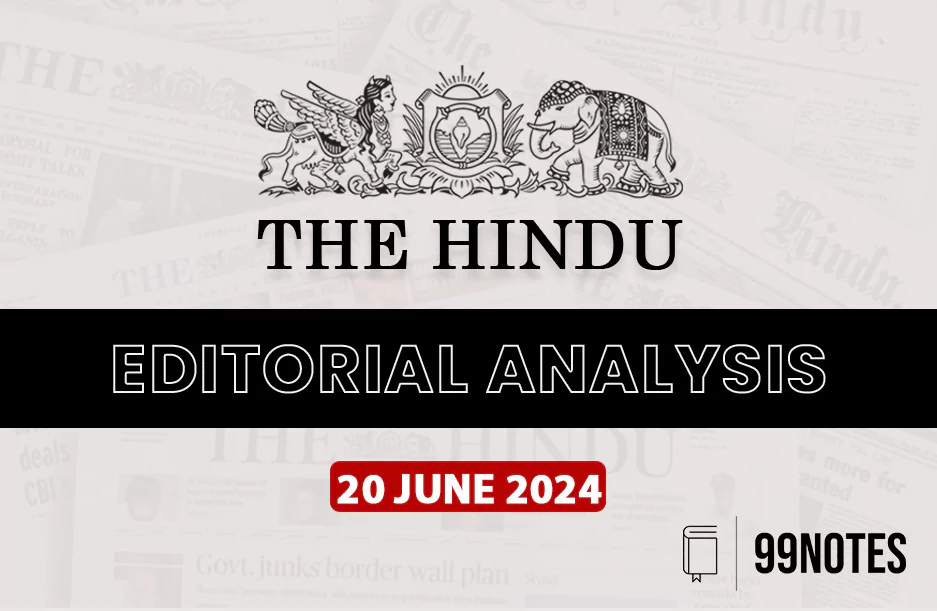20 June 2024 : The Hindu Editorial Analysis
1. Blueprints beyond borders, for solace and shelter
(Source – The Hindu, International Edition – Page No. – 8)
| Topic: GS2 – Governance |
| Context |
|
Refugee Crisis Overview
- Today, there are over 43.4 million refugees globally, with numbers rising due to ongoing conflicts.
- Refugees are often reduced to mere statistics, but they are human beings with needs, fears, hopes, and dreams.
- World Refugee Day on June 20 is a sombre occasion to reflect on the lives of uprooted individuals and the importance of providing them with safe havens and protection.
India’s Historical Role in Providing Asylum
- India has a long history of granting asylum, dating back to ancient times.
- Examples include Jews fleeing to India centuries before Christ, Zoroastrians escaping Islamic persecution in Persia, East Bengalis during the 1971 war, and more recent groups like Tibetans, Sri Lankan Tamils, Nepalis, Afghans, and Rohingyas.
- The 1947 partition of India and Pakistan led to one of the largest refugee crises in history, with 13 to 15 million people crossing borders, making India acutely aware of the refugee plight and the need to rebuild lives.
Lack of Legislative Framework
- Despite its history, India is not a signatory to the United Nations Refugee Convention or its 1967 Protocol.
- India also lacks a domestic asylum framework, relying on ad hoc measures to handle refugees.
- This inconsistency is at odds with India’s historical generosity and fails to uphold its tradition of asylum.
Proposal for a National Asylum Law
- In February 2022, a Private Member’s Bill was introduced in the Lok Sabha, proposing a Refugee and Asylum law.
- The Bill aimed to establish criteria for recognizing asylum seekers and refugees and outline their rights and duties.
- The legislation was proposed to address the government’s failure to honour the principle of non-refoulement, which prohibits sending individuals to places where they may face persecution.
Recent Government Actions
- The expulsion of Rohingya refugees to Myanmar in violation of international law highlighted religious intolerance and arbitrary conduct.
- A 2017 Ministry of Home Affairs circular classified Rohingyas as “illegal migrants,” leading to their detention in poor conditions across India.
- The Bill sought to ensure asylum for all foreigners, regardless of nationality, race, or religion, and proposed a National Commission for Asylum to oversee applications.
Current Legal Framework
- India’s existing laws like the Foreigners Act, Registration of Foreigners Act, Passports Act, Extradition Act, Citizenship Act, and Foreigners Order club all foreigners together as “aliens.”
- Without subscribing to international conventions or a domestic framework, refugee issues are handled inconsistently, and refugees face the constant threat of deportation.
- A comprehensive law is needed to ensure refugees can access public services, medical facilities, educational institutions, and employment opportunities.
The Need for a National Asylum Law
- Enacting a National Asylum Law would align India with its historical values and humanitarian principles.
- The proposed Bill would position India as a global leader in asylum management and demonstrate its commitment to democratic values.
- The law would offer a structured approach to managing asylum seekers and refugees, reducing reliance on arbitrary decisions by officials.
Judicial Perspective
- In 1996, the Supreme Court of India ruled that everyone in India, regardless of nationality, is entitled to rights under Articles 14, 20, and 21 of the Constitution.
- The Court stopped the forcible eviction of Chakma refugees in Arunachal Pradesh, asserting that asylum applications must be processed properly.
- A consistent legal framework would ensure that refugee rights are upheld uniformly, reducing reliance on individual judicial interpretations or bureaucratic whims.
International Cooperation and India’s Role
- Refugee problems require global cooperation, and India, as a significant global player, must contribute to finding solutions.
- By enacting a robust asylum law, India would uphold its tradition of humanitarianism and demonstrate its commitment to global refugee management.
- Such actions would affirm India’s role as a vishwaguru, dedicated to serving humanity and upholding democratic values.
Conclusion
- Enacting a National Asylum Law is essential for India to live up to its historical legacy and humanitarian commitments.
- The law would provide a structured, consistent approach to refugee management, ensuring protection and rights for asylum seekers.
- By leading in this area, India would enhance its global standing and reaffirm its dedication to democratic and humanitarian principles.
| PYQ: How illegal transborder migration does pose a threat to India’s security? Discuss the strategies to curb this, bring out the factors which give impetus to such migration. (200 words/12.5m) (UPSC CSE (M) GS-3 2014) |
| Practice Question: Discuss India’s historical role in providing asylum to refugees and evaluate the need for a comprehensive National Asylum Law in the context of current international standards and humanitarian principles.(250 Words /15 marks) |
2. Invisible suffering of Rohingya refugees
(Source – The Hindu, International Edition – Page No. – 9)
| Topic: GS2 – International Relations, GS2 – Governance |
| Context |
|
Psychosocial Support for Rohingya Women Refugees
- During a psychosocial support session for Rohingya women refugees in Delhi, participants laughed while discussing their anxieties, revealing the deep-seated trauma and fear they experience regularly.
- Psychotherapists note that laughter can be a defence mechanism for trauma survivors to shield themselves from feeling their pain fully.
- UNHCR Data: According to December 2023 data from the United Nations High Commissioner for Refugees, over 22,000 Rohingya refugees reside in India.
Background and Current Conditions
- Fleeing Myanmar: Most Rohingya refugees in India fled Myanmar between 2012 and 2017 due to military “clearance operations” involving killings, rapes, and village destructions.
- Trauma and Fire: Living in makeshift huts in Delhi, refugees have witnessed repeated fires, both accidental and intentional, which re-traumatize them.
Mental Health Crisis
- Acute Illnesses: Many refugees report severe mental health issues such as anxiety, dissociative episodes, and self-harm.
- Compounded Trauma: Discriminatory conditions in India exacerbate their trauma, as they are labelled “illegal immigrants” and denied basic rights and services.
- Fear of Detention: Anxiety is heightened by the fear of arbitrary detention and deportation despite having United Nations High Commissioner for Refugees recognition.
Detention and Legal Challenges
- Detention Statistics: Interviews reveal that around 500 Rohingya detainees, including women and children, are held in detention centres across India without criminal charges.
- Case Example: A refugee was detained for nearly three years and released only after becoming seriously ill, highlighting the harsh conditions and lack of mental health support.
Lack of Support and Funding
- Limited Support: Civil society organisations face funding challenges due to cancelled Foreign Contribution Regulation Act licences, leading to reduced or shut-down support programs.
- UNHCR Efforts: A few United Nations High Commissioner for Refugees-supported organisations continue their work but are not operating at full capacity due to cautious approaches and limited resources.
Need for International Attention and Action
- There is an urgent need for international attention to the mental health crisis among Rohingya refugees in India.
- Proposed Solutions:
- Mitigating Re-traumatization: Address core causes of trauma by providing refugees with dignity, agency, and official recognition.
- Healthcare Access: Ensure that all refugees with United Nations High Commissioner for Refugees cards can access primary and tertiary healthcare facilities.
- Support for Grassroots Organizations: Enhance support for grassroots organisations to create safe spaces for refugees to receive help and begin their healing journeys.
Conclusion
- A comprehensive and multi-Pronged approach is essential to address the mental health needs of Rohingya refugees in India, involving dignity, healthcare access, and support for local organisations.
- The international community must recognize and act upon the escalating mental health epidemic faced by these refugees.
|
PYQ: Q. Consider the following pairs: (UPSC civil services prelims 2016) Community sometimes mentioned in the news In the affairs of 1 Kurd Bangladesh 2 Madhesi Nepal 3 Rohingya Myanmar Which of the pairs given above is/are correctly matched? (a) 1 and 2 Ans- Option C |
| Practice Question: Examine the Rohingya crisis and its impact on refugees in India. Discuss the challenges they face and evaluate the need for a comprehensive policy framework to ensure their rights. How can India balance humanitarian responsibilities with national security concerns? (250 Words /15 marks) |






